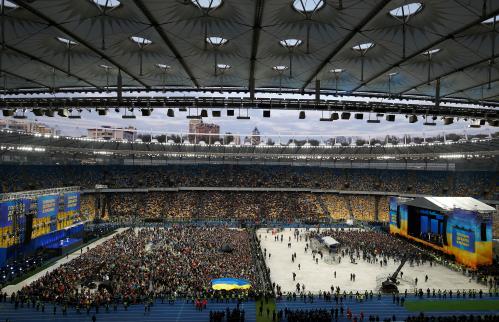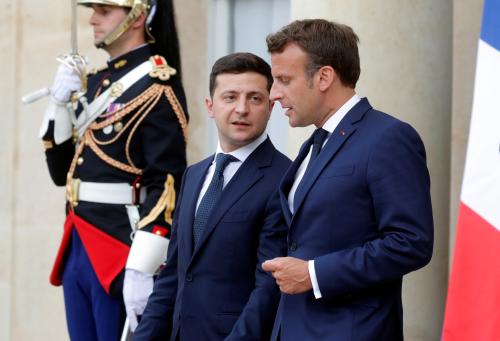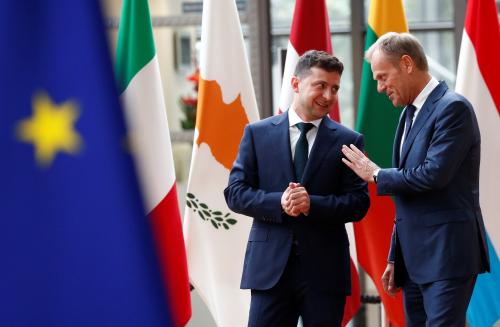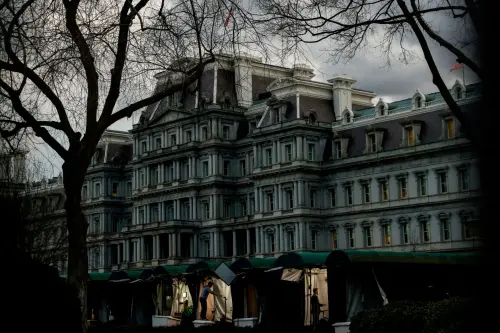Heading into Ukraine’s July 21 parliamentary elections, new President Volodomyr Zelenskiy is riding a high. Having swept into office in late May with 73% of the vote, Zelenskiy is poised to take a commanding share of the Ukrainian Rada (parliament), if not an outright majority.
Most polls have his Servant of the People Party with somewhere between 42% and 48% of the vote, figures that are unheard of in a system in which a top party rarely wins more than one-third. The next most popular party, the pro-Russian Opposition Bloc, has only 15% of the vote according to polls.
Zelenskiy’s promises of change inspire optimism
Zelenskiy, a comedian who rose to fame playing a political-novice-turned-president on his television show “Servant of the People,” has promised a complete overhaul of Ukraine’s political system. Optically, he has succeeded. At 41, Zelenskiy is only 12 years younger than his predecessor, Petro Poroshenko. However, his boyish looks and unflagging energy stand in sharp contrast to Poroshenko, who frequently looked like an old dog resisting learning new tricks. Poroshenko, a long-time politician and the billionaire “chocolate king of Ukraine,” was a relic of the Soviet era and its tumultuous aftermath. Zelenskiy represents the new Ukraine—young, dynamic, European, and ready to throw off the burdens of Ukraine’s history and its corrupt and oligarchic system.
As he settles into his presidency and prepares for parliamentary elections, Zelenskiy has quite literally rolled up his sleeves—he frequently eschews the suit and tie—and begun to make changes. Many of these are cosmetic, designed to show voters that he is serious about using the instruments of the state to benefit the people, even without a loyal faction within the parliament to push through legislation. Zelenskiy canceled this year’s Independence Day military parade, and instead used the money to pay bonuses to Ukrainian service members fighting in the east. He has reduced the number of presidential staff and has announced plans to relocate from the imposing Presidential Administration building to a smaller, more welcoming space.
So far, Zelenskiy’s strategy is working, as I saw first-hand during a recent study trip to Ukraine, sponsored by the Heinrich-Böll Foundation. In a July 9 International Republican Institute (IRI) poll, 67% of Ukrainians approved of Zelenskiy’s job performance. More striking was Ukrainians’ change in attitudes from IRI’s September 2018 poll. Forty-eight percent of Ukrainians expected the economy to improve in the next 12 months, compared to 14% in the previous poll. The number of Ukrainians who said they were pessimistic about the future dropped dramatically, from 71% to 39%.
Questions remain about ties to oligarch Kolomoisky
Once the elections are over, Zelenskiy will need to move beyond symbolic gestures to the business of governing; that is where the questions begin. Zelenskiy’s early days in office have partly assuaged fears that he is a pawn of the notorious oligarch Ihor Kolomoisky, whose 1+1 channel carried Zelenskiy’s television show. Diplomats and others who have spent time with Zelenskiy praise his intellect, his commitment to conquering a very steep learning curve, and his talents as a natural communicator. But the records of those around him are mixed.
Observers estimate the composition of Servant of the People’s parliamentary list is one-third reformers, one-third individuals with personal or business ties to Zelenskiy, and one-third Kolomoisky allies. A leaked list of eight regional governor nominees was similarly checkered. Among his early appointees, Zelenskiy’s chief of staff, Andriy Bogdan, has raised the most eyebrows due to his former role as Kolomoisky’s attorney. Those inclined to give Zelenskiy the benefit of the doubt note that Bogdan has represented every powerful figure in Ukraine, so is likely beholden to none. According to this argument, Bogdan is the man you hire if you want to get things done, partly because he knows the oligarchs and how to balance them against one another.
Making difficult reforms a reality
Making good on his reform promises will require Zelenskiy to handle the oligarchs carefully and eventually face them head-to-head. In addition to immediate anti-corruption steps required by Ukraine’s current $3.9 billion International Monetary Fund stand-by arrangement, there is a long list of structural reforms necessary to strengthen governance and the rule of law, root out corruption, and draw foreign investment. All of these will touch on oligarchic interests.
The post-Cold War pattern of reform in Ukraine is two steps forward, one (or more) steps back. Laws are passed, but implementation lags or leaves holes for oligarchs to exploit, depriving the Ukrainian people of the benefits of reform. Over time, this backsliding inevitably results in a loss of faith in the country’s leaders. Periodically, this frustration boils over, causing Ukrainians to spill out onto the streets to demand more from their politicians. This is the story of the 2004 Orange Revolution and 2014’s Revolution of Dignity. To a lesser extent, it is also the story of Zelenskiy’s election, a revolution at the ballot box borne of dissatisfaction with Poroshenko’s unwillingness to break the corrupt, oligarchic system and commit fully to reform.
Zelenskiy’s popularity and the strength of his mandate are a double-edged sword. The parliamentary elections will give him the power necessary to fulfill his promises of systemic reform. Now he will have to use it. If he does, he will face fierce opposition from Ukraine’s oligarchy, the tentacles of which reach deep into Ukrainian society. If he does not, the Ukrainian people will quickly recognize once again that promises of reform don’t put food on the table or money in their pockets, and they will once again become disillusioned.
The agenda before Zelenskiy is daunting, and his choice will soon become apparent. If he chooses reform, the United States, the European Union, and the International Monetary Fund should redouble their support to ensure that reforms are carried through to implementation, that results touch the lives of ordinary Ukrainians, and that Zelenskiy has the tools he needs to battle Ukraine’s oligarchs.
The Brookings Institution is committed to quality, independence, and impact.
We are supported by a diverse array of funders. In line with our values and policies, each Brookings publication represents the sole views of its author(s).









Commentary
In Ukraine’s parliamentary elections, President Zelenskiy’s party is likely to dominate
But more power is a double-edged sword
July 15, 2019